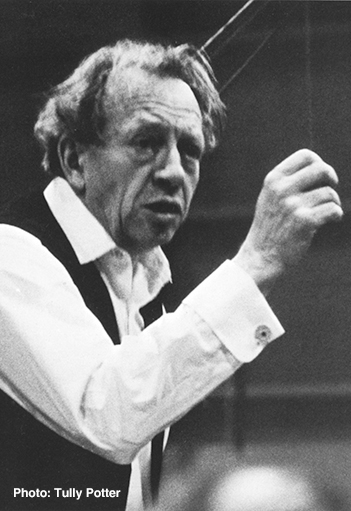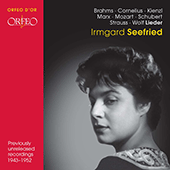Leopold Ludwig
At the time of Leopold Ludwig’s birth, his home town Witkowitz, located in Moravia, was a part of the Hapsburg empire. Active as a church organist by the age of ten, he went on to study piano at the Vienna Academy of Music with Emil Paur between 1927 and 1930 and decided to seek a career as a conductor after hearing a radio broadcast from the 1931 Bayreuth Festival of Furtwängler conducting Tristan und Isolde. Having made his conducting debut in the Silesian town of Opava before moving on to Brno (then the capital of the province of Moravia/Silesia), he obtained his first major appointment in 1936 when he accepted the post of chief conductor of the Oldenburg Opera in northern Germany. Soon Ludwig was conducting as a guest in Berlin before moving to Vienna as a permanent conductor at the State Opera in 1939; here he stayed for four years before returning to Germany and to Berlin to take up a similar position with the Städtische Oper (later to become the Deutsche Oper).
Following the collapse of the Third Reich, Ludwig continued to conduct in Berlin as a guest at both the Städtische Oper and the Staatsoper; but the appointment through which he is best known, as chief conductor of the Hamburg State Opera, commenced in 1950. He stayed with this company until 1971, working closely with its intendant and chief producer Günther Rennert. Under Ludwig’s musical leadership the Hamburg company flourished, appearing in 1952 at the Edinburgh Festival, where it presented the first performance in Britain of Hindemith’s Mathis der Maler, and later at Sadler’s Wells in London, where its repertoire included the company’s famous production of Berg’s Lulu (which was recorded by EMI). During his time at Hamburg Ludwig was also active as a guest conductor internationally: he made his debut with the San Francisco Opera in 1958, and first appeared at the Glyndebourne Festival in 1959, conducting Richard Strauss’s Der Rosenkavalier that year and the next; at the 1966 Festival he led Rennert’s stark production of Handel’s Jephtha. He conducted the Hamburg company when it appeared at the Lincoln Center Festival in New York in 1967, once again featuring Mathis der Maler, and made his Metropolitan Opera debut in 1970 with Wagner’s Parsifal. Ludwig had been active as a guest conductor at the Vienna State Opera from 1963 onwards, and after giving up the post of chief conductor at Hamburg he stayed with the company as chief guest conductor until 1973, serving also as musical adviser to the Basle Symphony Orchestra for the 1969–1970 season.
Ludwig was a fine example of the German Kapellmeister in the best sense of the word. In both the opera house and the concert hall he could be relied upon to deliver fully realised performances, both technically and dramatically. His conducting style was clear and undemonstrative, with quite a wide beat. He conducted a large repertoire and was a notable exponent of contemporary German music, leading the first performances of Krenek’s Pallas Athene weint (1955), Henze’s Der Prinz von Homburg (1960) and Klebe’s Figaro lässt sich scheiden (1963) and Jacobowsky und der Oberst (1965). His gramophone career commenced before World War II with recordings for the Polydor and HMV labels in which he conducted the Berlin Philharmonic, Berlin Staatsoper and Dresden Philharmonic Orchestras in repertoire that consisted predominantly of orchestral items from operas.
After the war his name appeared on several Urania issues of material that had originated in Berlin, including the baritone Josef Metternich’s account of Mahler’s Lieder eines fahrenden Gesellen, and Weber’s Abu Hassan with Elisabeth Schwarzkopf, Erich Witte and Michael Bohnen. He was active conducting accompaniments for both the Deutsche Grammophon and Columbia (UK) labels; these included several recordings of piano concertos by Liszt, Rachmaninov and Tchaikovsky with the Hungarian pianist Andor Foldes (for Deutsche Grammophon) and exceptionally fine readings of Beethoven’s Piano Concertos Nos 4 and 5 with Emil Gilels, as well as excerpts from Wagner’s operas with Hans Hotter and Birgit Nilsson (all for EMI). Two of his most interesting Deutsche Grammophon releases were an early recording of Mahler’s Symphony No. 4 with the Dresden Staatskapelle and Anny Schlemm, and excerpts from Mathis der Maler with Dietrich Fischer-Dieskau and the Berlin RIAS Orchestra.
At the dawn of the stereo era Ludwig made several notable recordings of major orchestral works for the short-lived Everest label. These included another early Mahler recording, of the Symphony No. 9, and Richard Strauss’s Ein Heldenleben; as well as popular symphonies by Dvořák, Mozart and Schubert. He also conducted several records published by the Hamburg-based and American-financed Miller International label, and CBS published an account of Beethoven’s Symphony No. 9 ‘Choral’ with the Berlin Symphony Orchestra. Several broadcasts of complete opera performances which Ludwig conducted have appeared, for instance of Mozart’s Don Giovanni, Richard Strauss’s Elektra, Wagner’s Tannhäuser and Weber’s Der Freischütz, all examples of the weighty repertoire in which he excelled. The EMI recording of the unfinished version of Berg’s Lulu, with Anneliese Rothenberger in the title role and the forces of the Hamburg State Opera, is perhaps his most outstanding monument on record.
© Naxos Rights International Ltd. — David Patmore (A–Z of Conductors, Naxos 8.558087–90).

















